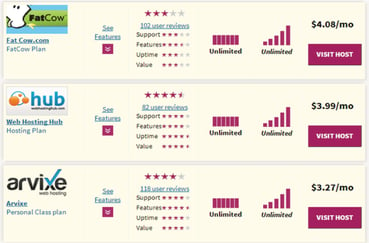Web Hosting for Merchants, Getting Retailers Back to Bed

By Amberly Dressler, Managing Editor
An ecommerce website never sleeps, but with the right Web hosting and support, its owner may get to.
When it comes to their hosting needs and demands, Internet retailers face a unique set of challenges to ensure the availability and security of their websites. Once they understand the opportunities and limitations of Web hosting for merchants, however, the better rested they'll be and the better prepared their enterprises will be for digital success.
Sharing Isn't Caring
Web performance hits Internet retailers where it really matters - their bottom lines. Two years ago, Tagman, a tag management system, found that every second of delay in page loading time can result in a seven percent decrease of online sales. Conversely, this year software company Intuit reported that each one second improvement in page load times yields a three percent increase in conversion rates. Of course there are many factors that go into how fast or slow a website loads - everything from image size and redirects to third-party tags and geographic area - but which Web hosting provider (and package) a merchant chooses is where it ultimately begins.
Shared hosting is often used by merchants on a shoestring budget, but since their websites are essentially sharing the same resources as the dozens, hundreds or even thousands of websites also on that server, response times (depending on the host, of course) can be painfully slow, especially when one of the websites on the same server sees an influx in traffic. Low-cost shared hosting plans can work for Internet retailers with low-traffic expectations, but those marketing their websites more aggressively may need to look elsewhere. DreamHost, for example, recommends virtual private server (VPS) hosting for businesses experiencing rapid growth, heavy website traffic or running complex applications. While dedicated hosting is also a possibility, many retailers are turning to the cloud, both public and private.
Bandwidth Reduction Strategies
Improve your website efficiency with these four techniques available at wsm.co/lowerbw. Help from Above?
One concern that Internet professionals often have about "the cloud" is around security. According to Jordan Jacobs, vice president of product at SingleHop, however, this concern is misguided. Singlehop is one of the many cloud providers that offer a variety of safeguards and take guidelines from the Payment Card Industry Data Security Standard (PCI DSS) very seriously.
It was only last year though that the PCI standards included cloud computing. Not surprisingly, the verbiage in the report tends to favor private clouds over public clouds for extra data security.
"In a public-cloud environment, one client's data is typically stored with data belonging to multiple other clients," the PCI Security Standards Council wrote. "This makes a public cloud an attractive target for attackers, as the potential gain may be greater than that to be attained from attacking a number of organizations individually. Strong data-level encryption should be enforced on all sensitive or potentially sensitive data stored in a public cloud."
It is the Council's recommendation that, regarding third-party or public clouds, clients should consider that while they can outsource the day-to-day operational management of the data environment, they retain responsibility for the data they put in the cloud. Clients are encouraged to "shop around" until they find a cloud service provider (CSP) that can provide the level of security and assurance they require, such as one that will work with them to understand their security and compliance needs.
Round-the-Clock Scaling, Support
Aside from cloud security, auto-scaling is also a popular consideration by retailers; it gives retailers the ability to scale their hosting capacity up or down automatically according to pre-defined conditions set by them.

Considering a new Web host? You may want to check out WhoIsHostingThis.com for its reviews and comparisons.
Jacobs of SingleHop is not surprised by the growth of auto-scaling capabilities, mainly because many merchants earn the majority of their revenues from Black Friday to the end of the year, but he also believes auto-scaling adds to merchants' anxiety and sleepless nights. He says it's important to scale, but it's better when a retailer can scale up when they understand their customers and scale the site themselves quickly to build a solid infrastructure.
"The truth is, what people do is enable [auto-scaling] and watch the chart and then they get nervous; but when you control it and deploy five more nodes, you can get back to bed and relax," said Jacobs. "Auto-scaling is engrained in a lot of new technology but sometimes the old way just works."
Kelly Meeneghan a manager at 1&1 Internet, Inc. believes this to be one of the main reasons cloud servers are a great option for retail and seasonal businesses.
"Though it is most ideal for those more technically experienced, cloud users receive full flexibility and can maintain full control over the amount of technical resources that are used at any time," said Meeneghan. "By configuring a website's RAM, hard disk space, and CPU as needed, users will only pay for what you use and adjust online requirements at any time.
"During the holiday rush, they can scale resources up to accommodate the increase in online traffic. Once the rush is over, the resources can be scaled back down to the normal, lower settings."
Of course, hosting providers would prefer merchants to pay for fully managed hosting solutions when they monitor the retailers' websites themselves, often addressing things like traffic, load problems, software upgrades, security audits, backups and more. Jacobs may have put it best, when he said SingleHop's technicians are 100 feet from the server and respond to any concerns in real-time, allowing merchants to, again, go back to sleep.
Regardless, retailers should have access to their hosting provider day or night.
"Most business owners focus heavily on business operations during the typical 9-5 hours and their website presence after hours," said Meeneghan of 1&1. "This often causes much anxiety over receiving the necessary support they may need for questions regarding their website design or performance. Retailers should ensure that their hosting provider offers an experienced support team that is available 24/7 for any requirements they may need, no matter what time of day. As the owner's website is open all day, every day, they should be able to leverage reliable support during those times."
Web hosting can clearly be a big investment and a huge cause of stress for ecommerce merchants, but with the right performance, security and support mechanisms in place, they can rest easy knowing their customers are getting a reliable and secure environment to shop on, and they are being comforted by increased conversions.








